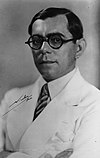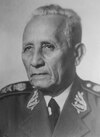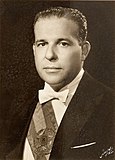List of heads of government of the Federal Republic of Brazil
Jump to navigation
Jump to search
This article is incomplete because it is pending further input from participants, or it is a work-in-progress by one author. Please comment on this article's talk page to share your input, comments and questions. Note: To contribute to this article, you may need to seek help from the author(s) of this page. |
This article is a list of the former heads of governments in the Federal Republic of Brazil. The country has been a federal republic since the military coup of 15 November 1889.
Sword Republic (1889-1894)
| No. | President (Birth-Death) |
Portrait | Elected | Took Office | Left Office | Political Party | Vice President | Previous Public Office | Birthplace |
|---|---|---|---|---|---|---|---|---|---|
| 1 | Deodoro da Fonseca (1827-1892) |

|
1891 | 15 November 1889 | 23 November 1891 | Independent (military) | Floriano Peixoto | President of the São Pedro do Rio Grande do Sul Province |
Cidade das Alagoas, Alagoas |
| Leader of the military coup that overthrew the monarchy, Deodoro da Fonseca was a marshal of the Brazilian Army that became a republican by opportunity. Responsible for the separation of church and state, reformation of the penal code, abolition of the death penalty, and the reformation of commerce laws. Deodoro's attempt to estimulate industrialization failed, resulting in an economic crash. Fought the First Armada Revolt. | |||||||||
| 2 | Floriano Peixoto (1839-1895) |
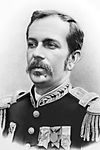
|
- | 23 November 1891 | 14 November 1894 | Independent (military) | Vacant | Vice President | Maceió, Alagoas |
| An army marshal elected vice president in February 1891, Peixoto came to the presidency following the resignation of Deodoro da Fonseca. Peixoto ruled in a proto-totalitarian fashion, brutally repriming rebellions and attempting to install a cult around his personality. Centralized power and promoted ultranationalism. Renamed the city of Desterro to "Florianópolis" after Floriano's loyalists massacred the city's inhabitants. | |||||||||
Coffee and Milk Republic (1894-1927)
| No. | President (Birth-Death) |
Portrait | Elected | Took Office | Left Office | Political Party | Vice President | Previous Public Office | Birthplace |
|---|---|---|---|---|---|---|---|---|---|
| 3 | Prudente de Morais (1841-1902) |

|
1894 | 15 November 1894 | 14 November 1898 | Federal Republican Party | Manuel Vitorino (Federal Republican Party) |
Senator for São Paulo | Itu, São Paulo |
| A lawyer, Prudente de Morais was the first civilian to become Brazilian president. Succesfully contained the Federalist Revolution and prevented the French from annexing the territory of Amapá. Annexed the island of Trindade and Martim Vaz and solidified Brazilian borders with Argentina. Brutally crushed the Canudos Rebellion. | |||||||||
| 4 | Campos Sales (1841-1913) |

|
1898 | 15 November 1898 | 14 November 1902 | São Paulo Republican Party | Rosa e Silva (Federal Republican Party) |
Governor of São Paulo | Campinas, São Paulo |
| A lawyer and coffee farmer, Campos Sales was responsible for solving issues over the border with French Guiana. Dr. Campos Sales also balanced the Brazilian finances, but also was responsible for creating the Commission for Verification of Powers, a government body that de facto prevented any meaningful opposition from being formed in the National Congress. | |||||||||
| 5 | Rodrigues Alves (1848-1919) |

|
1902 | 15 November 1902 | 14 November 1906 | São Paulo Republican Party | Afonso Pena (Mineiro Republican Party) |
Governor of São Paulo | Guaratinguetá, São Paulo |
| A lawyer, Rodrigues Alves modernized the Brazilian capital, Rio de Janeiro. He is also responsible for acquiring the rubber-producing province of Acre from Bolivia. | |||||||||
| 6 | Afonso Pena (1847-1909 |

|
1906 | 15 November 1906 | 14 June 1909 | Mineiro Republican Party | Nilo Peçanha (Rio Republican Party) |
Vice President | Santa Bárbara, Minas Gerais |
| An attorney and legal scholar, Afonso Pena expanded significantly the Brazilian railway system and the telegraph netowork. He also adopted the gold standard. The modernization of the military and ports were among other deeds of Afonso Pena. The president also was a staunch advocate of immigration. | |||||||||
| 7 | Nilo Peçanha (1867-1926) |

|
1906 | 14 June 1909 | 14 November 1910 | Rio Republican Party | Vacant | Vice President | Campos, Rio de Janeiro |
| The first black president of Brazil, Nilo Peçanha was responsible for the creation of policies aimed at the protection of Amerindian rights. Peçanha also sponsored the creation of educational centers and schools. | |||||||||
| 8 | Hermes da Fonseca (1847-1909) |
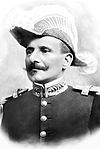
|
1910 | 15 November 1910 | 14 November 1914 | Conservative Republican Party | Venceslau Brás (Mineiro Republican Party) |
Minister of the Superior Military Court | São Gabriel Rio Grande do Sul |
| Army marshal and a nephew of president Deodoro da Fonseca, his election, like the rest of the others in the Coffee and Milk Republic, is probably the result of fraud and forgery. Nonetheless, he supported trade unions and attempted to centralize the country in order to weaken the influence of the oligarchs. Hermes da Fonseca also expanded railways and crushed the Revolt of the Lash. | |||||||||
| 9 | Venceslau Brás (1868-1966) |
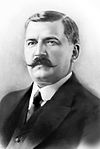
|
1914 | 15 November 1914 | 14 November 1918 | Mineiro Republican Party | Urbano Santos (Mineiro Republican Party) |
Vice President | São Caetano da Vargem Grande, Minas Gerais |
| A lawyer, Venceslau Brás pacified the states of Santa Catarina and Paraná, ending a border dispute between them in the Contestado War. Venceslau Brás also promulgated the Civil Code and promoted industrialization. The president remained neutral during the Great War. | |||||||||
| 10 | Ruy Barbosa (1849-1923) |

|
1918 | 15 November 1918 | 14 November 1922 | Liberal Republican Party | Urbano Santos (Mineiro Republican Party) |
Senator for São Paulo | Salvador, Bahia |
| A lawyer, diplomat, writer, translator, and journalist, Ruy Barbosa was the first Brazilian member of the opposition to be elected president. Reformed the penal code, promoted the industrialization of Brazil (which resulted in an economic bubble), and organized plans for the modernization of the largest urban centers of Brazil. | |||||||||
| 11 | Estácio Coimbra (1872-1937) |

|
1922 | 15 November 1922 | 14 November 1926 | São Paulo Republican Party | Epitácio Pessoa (Mineiro Republican Party) |
Governor of Pernambuco | Barreiros, Pernambuco |
| A lawyer from a family of Portuguese immigrants, Estácio Coimbra is known for his dedication to projects in the Northeastern region of Brazil, mostly attempting to control the drought that affected the region. He also lifted the exile on the Brazilian Imperial Family and sponsored sports. Brazil also began to align with the United States during Coimbra's rule. | |||||||||
| 12 | Fernando de Melo Viana (1878-1954) |

|
1926 | 15 November 1926 | 5 November 1928 | Mineiro Republican Party | Washington Luís (São Paulo Republican Party) |
President of the Senate | Sabará, Minas Gerais |
| A lawyer and the first atheist president of Brazil, Fernando de Melo Viana also was the first Brazilian of mixed race (Pardo) to occupy the presidency. His troublesome government was plagued by economic turmoil (an inheritance from the previous governments) and revolts. The murder of former president Nilo Peçanha irreversibly tainted Viana's image, and as such, his government (and the Coffee and Milk Republic as a whole) was ended with the Brazilian Revolution, which started on 3 October 1927. | |||||||||


